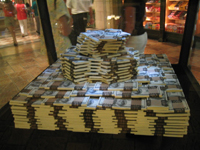Mentally deranged individuals make loads of money
The brain of those who have a knack for making money has a damaged part responsible for emotions, according to U.S. scientists. Rumor has it that F. Scott Fitzgerald and Ernest Hemingway, the heavyweights of American literature, had a terrible falling-out because of their opposing viewpoints on the rich.

Fitzgerald said that “the very rich are different from you and me.” Hemingway agreed by making a cynical remark: “They surely are because they’ve got more money.” The scientific findings show that Fitzgerald was closer to the truth.
Actually, wealth is a hereditary thing. But you do not have to be born into the Rothschild family to be rich. A little bit of brain damage is all it takes.
U.S. scientists concluded that the brain of those with a knack for making money had a damaged part responsible for emotions. Such people are better at making money because they are not afraid of taking risks.
Persons involved in a research were supposed to bet in a simple game of chance. The participants of the above category were never discouraged from taking fresh chances and staking more money following a loss. And they won in the end. Their behavior was completely different from that of the ordinary species.
It would be impossible to write off as mediocre such an eccentric character like the businessman Howard Hughes who wore rubbers gloves and let his facial hair grow for years, or the millionaire Howard Marshall II who married a stripper while being thrice her age. Eventually, he bequeathed all his property to her. Some people would call the above gentlemen crazy.
There are many ways to get rich. Ostap Bender (“the great schemer”), hero of Ilya Ilf’s and Yevgeny Petrov’s satirical novel The Twelve Chairs, had four hundred relatively legal ways of “relieving the population of their money.” However, there was no such thing as the Internet in the great schemer’s time.
Ostap Bender would have learned at least two tips on how to get rich had he used a search engine on his computer. He would have been advised to sell products like Herbalife (some dopes still fall for it) and follow guidelines that can be downloaded in large numbers via the Internet.
In case you already tried any of the above, and still believe in the print word, here is some more for your consideration:
1. Buy a lottery ticket with winning numbers. By the way, a lucky man has recently won $365 million in the state of Nebraska. Every store, snack bar or gas station has a lottery vending machine in that land of fancy i.e. Nebraska. The chances of guessing all six winning numbers are roughly 1 to 146 million. But the people still believe in miracles. On the average they are estimated to put 29 coins a second into the slots of vending machines.
2. Tie the knot with a real moneybags. After all, it seems a fairly good idea. I’ve already mentioned the case of Howard Marshall II and the stripper Anne Nichole Smith. However, Mrs. Smithhas not been able to lay hands on her legacy for 11 years. The millionaire’s son happened to be a scrooge and filed lots of lawsuits against her.
3. Find a treasure-trove. Some individuals search for treasures hidden in the earth and other places for a living. The professional treasure-seekers normally have a seven-day stubble, a desolate look in their eyes, and a metal detector glued to the hands.
4. Invent some new gadget. For example, Swiss inventor George de Mestral came up with Velcro, a brand of fastening tape consisting of opposing pieces of fabric, one with a dense arrangement of tiny nylon hooks and the other with a dense nylon pile. The two pieces interlock when pressed together. It took the inventor eight long years to copy the characteristics of the thistle’s prickly flower heads.
5. Accumulate a million by saving up your salary. The above is the least probable way of getting rich. Who can be a millionaire against all odds?
True story No 1
Antonina Tsitsulina had never thought she would set up a company of her own one day. She served in the Russian Army as a warrant officer, stationed in the Defense Ministry. Having given birth to her first child in 1995, Antonina discovered that quality toys were in short supply on the Russian market. In 1998, she decided to improve the situation by starting her own toy-manufacturing company called “Smart Games”. She resigned from the army and founded the company with the help of 15,000 rubles, her entire child care benefit. Apart from producing an array of first-class toys designed for developing child’s mental abilities, her company also offers free-of-charge psychological advice on children’s education to the customers.
These days the former warrant officer Tsitsulina has six outlets selling toys in Moscow, with the annual sales totaling to 40 million rubles.
True Story No 2
Do you think it is too late to trade stocks when you are 83 years old? Well, you might as well think better of it. Ingerborga Mootz had been an ordinary German housewife all her life. Once she jokingly told her husband about her plan to trade stocks if the family budget should thin out. Her husband died six months later, leaving Ingeborga with 40,000 Deutsche Marks worth of shares of a German company. The 83-year-old widow took the inheritance as a sigh from above. “I remember thinking to myself: ‘I got to make a million out of that one thousand shares’,” says she. Her stock rose by 100% in value during 1997. The following year saw a 200% increase in value. Mrs. Mootz claims the simple technique does the trick. “I made a fortune simply by buying and selling stocks on the market,” says she.
She has already made some 500 thousand euros. And she still aims at making a million.
Izvestia Nauki
Translated by Guerman Grachev
Pravda.Ru
Subscribe to Pravda.Ru Telegram channel, Facebook, RSS!




